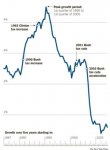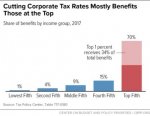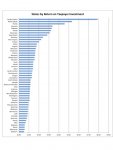But he said his income increased by about 2%, which you took to mean that his taxable income increased by 2%. This fails to account for the change in the standard deduction, which is one of the most significant changes that occurred.
Unless he's pulling in close to $200,000, his taxable income is actually less this year than in 2017, despite the 2% pay increase.
Let's take a quick look at someone making $30,000/year in 2017.
Income: $30,000
Standard Deduction: $10,400
Taxable Income: $19,600
Tax Liability: $2,474
Let's say he gets a 2% raise for 2018:
Income: $30,600
Standard Deduction: $12,000
Taxable Income: $18,600
Tax Liability: $2,042
Thus, despite an increase in income, the taxpayer benefits not only from a reduced tax rate, but an increase in the standard deduction. Taxable income actually goes down. The overall tax savings for this individual is $432. While I would call this a 17% reduction in tax over the previous year, you could also say that he paid 21% more last year than he did this year, which is completely in line with the original claim.




